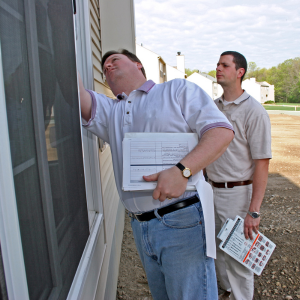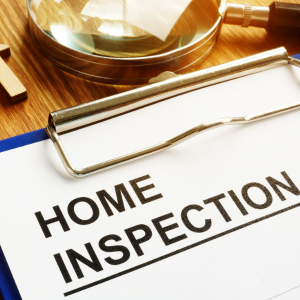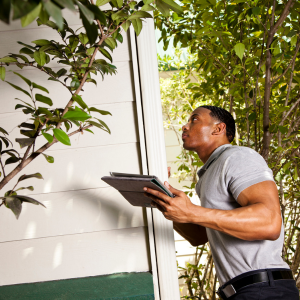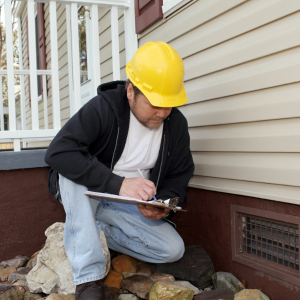
Understanding The Importance Of Home Inspections: What You Need To Know
Home inspections are an important step in the buying process, especially in Texas, where the real estate market is thriving. Home inspections are crucial for prospective buyers to understand their importance and scope.
These thorough examinations of a property can reveal any issues or defects that would otherwise go undetected during a walkthrough. A home inspection can prevent costly mistakes by identifying structural, electrical, and plumbing issues.
Negotiating repairs or a lower price with the seller becomes easier with this tool. With Texas’s unique factors, such as extreme weather conditions, it is even more critical to have a thorough understanding of the importance of home inspections before making one of your life’s largest investments.
The Role Of A Home Inspector: What They Look For During An Inspection

When buying a home in Texas, it’s crucial to comprehend the responsibility of a home inspector and their inspection criteria. Professionals who thoroughly inspect the property to identify issues and red flags are crucial to the real estate buying process.
A home inspector will inspect the roof, foundation, plumbing, electrical systems, and more. Inspections include structural damage, mold, water, and pest infestations.
Additionally, they will check the property’s safety and compliance with building codes. Home inspectors offer valuable information to buyers, supporting their decision-making process with their expertise and attention to detail.
Comprehensive Coverage: What Do Home Inspections Include?
Real estate purchasers of a house in Texas should be well-versed in the home inspection process. Usually including the structure, foundation, roof, plumbing, electrical systems, HVAC systems, and appliances, a thorough home inspection examines both the exterior and interior of the house.
Inspectors also may look for possible safety risks including lead paint, radon, and mold. Inspections also often cover spaces including the garage, crawl space, and attic.
All things considered, a thorough house inspection gives purchasers important knowledge about the state of the property and any possible problems that might call for attention before deciding to buy.
Exploring The Benefits Of A Thorough And Detailed Home Inspection

When it comes to purchasing a home in Texas, one of the most important steps for real estate buyers is to conduct a thorough and detailed inspection. This process gives buyers peace of mind and a thorough understanding of the property they’re investing in.
A thorough home inspection can reveal any potential problems or red flags that may not have been visible during the first viewing. This can help buyers avoid unexpected and costly repairs later on.
Additionally, a thorough inspection can assist in negotiating a fair price for the property based on its current condition. A home inspection in Texas offers real estate buyers valuable insights and benefits by thoroughly inspecting the house’s structure, systems, and functionality.
Key Factors To Consider When Choosing A Home Inspector
When it comes to buying a home in Texas, one of the most important steps is to have a thorough and reliable home inspection. This process entails hiring a qualified home inspector to thoroughly inspect the property for any potential issues or defects.
When selecting a home inspector, a real estate buyer must consider several key factors. First and foremost, the inspector must hold a Texas license and certification.
Choose inspectors who have extensive experience and knowledge of the local housing market. It is also advisable to read reviews and seek recommendations from reputable sources.
Furthermore, when scheduling an inspection, take into account their availability and flexibility. Finally, hiring the right home inspector can give you peace of mind and ensure that you make an informed decision when buying a new home in Texas.
Breaking Down The Different Types Of Inspections Available For Homes

A Texas home inspection is essential to buying a home. This thorough property inspection can reveal issues that could affect your purchase decision.
Did you know there are different home inspections? The three most common types are general, specialized, and new construction inspections. All major home components, including structure, plumbing, electrical, and more, are inspected.
Specialized inspections cover pools, septic systems, and pests. New homes are inspected for code compliance.
Understanding these options can help you choose a home inspection for your prospective home.
Understanding The Limitations Of A Home Inspection And What It Does Not Cover
In Texas, a home inspection is a crucial step for any prospective buyer. It offers a comprehensive evaluation of the property’s state and points out any possible problems that might need to be fixed.
It’s crucial to realize that a house inspection has its limitations, though. Although it includes coverage for a number of aspects of the property, some things are left out.
For example, testing for mold, septic tanks, and well systems, as well as termite and other pests, are usually not included in a home inspection. Buyers must therefore be aware of these restrictions and, if necessary, think about hiring specialized inspectors.
Furthermore, a home inspection does not ensure that there won’t be any issues or flaws later on after the sale. Having knowledge of these restrictions will enable consumers to make wiser choices while making purchases.
Common Red Flags Found By Inspectors That Can Save You From Costly Repairs

Getting a comprehensive house inspection is one of the most important stages in Texas home purchase. Apart from giving prospective consumers peace of mind, this can highlight any significant problems that might call for expensive repairs.
Trained experts will carefully evaluate the property during the inspection process and search for typical red flags suggesting more general issues down-stream. These red flags might call for problems with the foundation, roof, plumbing, electrical systems, or HVAC system.
Early on, identification of these issues allows buyers to negotiate for repairs or maybe avoid acquiring a house with major maintenance requirements. Before making a purchase of a house in Texas, buyers should thoroughly go over the inspection report and talk about any issues with their real estate agent.
Preparing For Your Upcoming Texas Home Inspection: Tips And Tricks
A Texas home inspection is essential to the buying process. This thorough property inspection can reveal issues or red flags that may influence your purchase.
Prepare for your home inspection as a real estate buyer. List any issues you want the inspector to focus on.
For inspection testing, turn on and access all utilities. Keep a copy of the property’s floor plan and previous inspection reports for comparison.
Finally, during the inspection, ask questions and clarify any doubts to fully understand the home’s condition before buying. After following these tips, you can confidently prepare for your Texas home inspection and make an informed decision about your new home.
Communication Is Key: How To Effectively Communicate With Your Inspector

To ensure a thorough and accurate home inspection, communicate with your inspector. Keep communication open with your inspector as a real estate buyer to address all of your questions and concerns.
Ask the inspector for clarification on findings and recommendations, and provide relevant property information to inform the inspection process. Request a detailed report from your inspector and follow up with any additional questions or concerns.
Actively communicating with your inspector can help you understand the property’s condition and make informed buying decisions.
Demystifying The Results: Making Sense Of Your Inspection Report
Obtaining a thorough home inspection is one of the most important steps in the home-buying process for a Texas real estate buyer. This comprehensive guide will walk you through the key aspects of a home inspection and what to expect during the process.
However, once you receive your inspection report, it can be difficult to understand all of the information. That is where demystifying the outcomes comes in.
This article will help you understand your inspection report and any potential issues with the property by breaking down each section of the report and explaining what it means to you as a buyer. Don’t let a complicated report prevent you from making an informed decision about your future home; continue reading to learn more about understanding your inspection results.
Maximizing Your Investment: How Investing In An Inspection Saves You Money In The Long Run

It’s crucial for Texas homebuyers to get a thorough home inspection. The property is inspected by a qualified inspector to identify any issues or repairs.
A home inspection may seem unnecessary, but it can save you money in the long run. You can negotiate a lower price or have the seller fix any hidden issues before closing by revealing them.
Saving thousands of dollars and avoiding costly surprises is possible. With a detailed home condition report, you can make informed maintenance and renovation decisions to maximize your investment.
Thus, Texas homebuyers should not overlook a home inspection.
Where To Find A Licensed And Trustworthy Home Inspector In Texas
If you are in the process of purchasing a home in Texas, one critical step you should not skip is scheduling a thorough home inspection. This entails hiring a licensed and trustworthy home inspector who can thoroughly assess the property’s condition and provide you with valuable information before making a purchasing decision.
Where can you find such an inspector in Texas? Consider seeking recommendations from a real estate agent or recent homebuyers. You can also look for certified home inspectors in your area online, but make sure they are licensed by the Texas Real Estate Commission (TREC).
Before making a final decision on which inspector to hire, make sure to conduct research and read reviews.
Why Every Texas Homebuyer Should Invest In A Professional Inspection

Texas homebuyers need home inspections. Potential homeowners can benefit from a professional inspection to gain peace of mind.
With Texas’ unpredictable climate and unique geography, it’s important to understand any potential home safety and integrity issues. An expert inspector can find foundation issues, water damage, and electrical issues.
Buyers can avoid surprises and headaches with this thorough inspection. Buying older homes or properties with previous renovations requires a professional inspection to ensure all permits were obtained and work was done to code.
A professional home inspection can give buyers an edge in a competitive Texas real estate market by providing critical information for informed decisions.
Uncovering Hidden Issues: What Happens During A Texas Home Inspection
A licensed Texas home inspector will thoroughly inspect a property’s structure and systems to find any issues. This several-hour process evaluates the foundation, roof, plumbing, electrical, HVAC, and other key components.
The inspector will additionally check for water damage, mold, and termites. Thermal imaging cameras may help them find hidden issues.
To ensure code compliance, they will review the property’s documentation and permits. After the inspection, the inspector will provide a detailed report with findings and recommendations for repairs or further evaluation.
Texas real estate buyers must attend their home inspection and ask questions to make informed investment decisions.
Navigating Trec’s Sops: When They Apply To A Home Inspection

When buying a home in Texas, it is critical to understand the ins and outs of home inspections. Navigating the Texas Real Estate Commission’s (TREC) Standards of Practice (SOPs) is an important step in this process.
These guidelines outline the state’s minimum requirements for home inspections and are applicable to all licensed inspectors. The TREC SOPs cover many aspects of a home inspection, such as structural components, HVAC systems, plumbing, and more.
Real estate buyers must become familiar with these standards in order to ensure that their potential property is thoroughly and accurately inspected. Failure to follow the TREC SOPs may result in disciplinary action against the inspector, so it is critical for both buyers and inspectors to follow these guidelines during home inspections.
How A Home Inspector Can Help You Make An Informed Decision
When buying a home in Texas, there are numerous factors to consider. A thorough home inspection is one of the most important steps in the buying process.
A qualified and experienced home inspector can provide valuable insights and information that will assist buyers in making an informed decision about whether or not to purchase a property. A home inspector evaluates a property thoroughly, including structural integrity, safety hazards, and code violations, and provides a detailed report for buyers to review.
This can provide buyers with peace of mind, knowing that they have all of the information they need to make an informed decision about their investment.
What Will Fail An Inspection In Texas?
Home inspections are an important part of the real estate buying process, particularly in Texas, where the housing market is thriving. As a buyer, you must have a thorough understanding of what exactly can fail an inspection in Texas.
During a home inspection, red flags can include structural issues like foundation and roof damage, as well as safety hazards like outdated electrical systems and faulty plumbing. Additionally, issues with HVAC systems, appliances, and even pest infestations can lead to an unsuccessful inspection.
To avoid future headaches and financial setbacks, thoroughly review the results of your home inspection and address any necessary repairs before finalizing your purchase.
What Does A House Need To Pass Inspection In Texas?

When buying a home in Texas, one of the most important steps is the home inspection. This process enables potential buyers to thoroughly assess the property’s condition and identify any future issues.
So, what exactly does a house require to pass inspection in Texas? First and foremost, it must comply with all state-mandated building codes and regulations. This includes functional electrical, plumbing, and HVAC systems, as well as a sturdy foundation and roof.
Furthermore, there should be no major safety risks present, such as mold or asbestos. Furthermore, the overall condition of the house should be satisfactory and not impose a significant financial burden on the buyer.
Understanding these key factors allows real estate buyers to ensure a successful home inspection in Texas and make an informed investment decision.
What Are Home Inspectors Not Allowed To Do In Texas?
When it comes to Texas home inspections, real estate buyers should be aware of the limitations of what home inspectors are not permitted to do. While they are trained professionals who thoroughly assess the condition of a property, some tasks are beyond their scope of practice.
Home inspectors, for example, are not permitted to provide repair estimates or to make any changes or modifications to the property under inspection. It is also forbidden for them to provide any warranty on the inspected property.
Furthermore, home inspectors are not permitted to conduct any invasive testing without the homeowner’s consent. Understanding these restrictions helps buyers navigate the home inspection process and set realistic expectations for their inspector in Texas.
What Passes Inspection In Texas?
All real estate buyers in Texas should be aware of the state’s home inspection regulations and standards. When it comes to what passes inspection in Texas, a few key areas are thoroughly investigated.
Home safety features include structural integrity, electrical, plumbing, and HVAC systems, as well as smoke and carbon monoxide detectors. Inspectors will also look for potential hazards or code violations, as well as the condition of the roof, foundation, and external walls.
Buyers must understand these factors in order to make an informed decision about purchasing a new home in Texas.
This information applies to Texas and its cities like Dallas, Fort Worth, Arlington, and more. For help or questions, call us at (214) 393-8026. You can also visit our website at House Buying Girls for more details.
Additional Resources To Help Sell Your House In Texas
| GUARANTEES | LICENSING | REALTOR | REAL ESTATE AGENTS | HOMEBUYING | MORTGAGE |
| MORTGAGE LENDERS | PLUMBER | EARNEST MONEY | SELLERS | HEATER | DOOR |
| WATER HEATERS | TOOL | LEAKS | APPRENTICE | GUTTERS | LOANS |
| WOOD | DRYWALL | CONSUMERS | MEDIAN HOME PRICE | HOME APPRAISAL | APPRAISAL |
| HOMEBUYERS | HEATING | FEE | ENERGY | CEILING | NEGOTIATIONS |
| NATURAL GAS | LENGTH | FIREPLACES | ESTATE AGENTS | WIRING | ELECTRICAL WIRING |
| DAMPER | LENDERS | COMPANY | BUDGET | TAX | REASON |
| REAL PROPERTY | REAL ESTATE TRANSACTION | PRESSURE | PAYMENT | HOUSTON, TX | TRANSACTION |
| INBOX | DUE DILIGENCE | DOWN PAYMENT | CHECKLIST | BLOG | |
| BATHROOM | HOME INSPECTION REPORT | GET A HOME INSPECTION |


